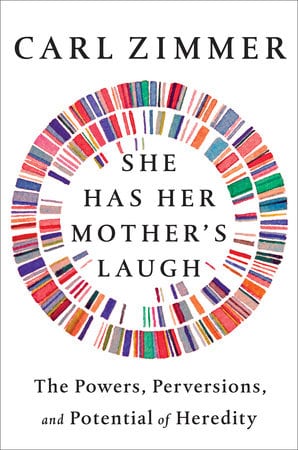In his regular column for The New York Times, Carl Zimmer writes with compelling clarity about genetics and human evolution explaining why the science matters, skills he deftly unleashes in his massive new book “She Has Her Mother’s Laugh: The Powers, Perversions, and Potential of Heredity.”
In this book, Zimmer looks at more than just the science, delving into the history, characters, and breakthroughs that have changed what we know about heredity. While this book focuses a lot on genetics, Zimmer also conveys that heredity is more than just biology, it’s also the cultural, social and environmental heritage we pass on to future generations. And it is here that the book draws its power.
Heredity
Zimmer appropriately brings our attention to the science and the potency of this information, but he also brings us context. Your DNA is important but it is never the whole picture of who or what you are. It’s surprising that even today, this is still not well understood.
And Zimmer illustrates how this persistent failure to understand the nuance and complexity of science leads to folly or much worse, as his book so ably outlines with the disturbing history of eugenics in the United States. As Zimmer writes “we cannot understand the natural world with a simplistic notion of genetic heredity.” There is not a “gene for intelligence” or a “gene for height.”
It’s much more complicated, and much more interesting than all that.
Genetic Inheritance
But more than these somber warnings Zimmer’s book is also a personal story — a reflection on what he and his wife passed onto their daughters, and the genetics he shares with his brother, his parents and his distant ancestors. How many of us have looked at our own children or our parents and wondered about what in us we share with them?
Zimmer explores all this by delving into the history of the science as well as his own genome, which he had sequenced. He also writes about the trepidation around learning something he can’t unlearn about risks he may pass onto his children. And he spends time in the book mulling over why so many of us are so enthralled with searching for our ancestors.
What draws us to be so fascinated about those who came before us?
Some Science History
Ultimately with his own story and the history of the science he writes about, Zimmer creates a sort of compendium of tales that capture critical concepts in genetics. Like all his best work, Zimmer digs into what is so fascinating and vital about the science, and he sprinkles surprising and sometimes shocking tidbits that draw us deeper.
For example, it really was only in the 19th century that scientists started to understand that there was some biological essence that parents passed onto their children. Traits had more to do with external factors like the weather, it was thought. It wasn’t about who your parents were. For example, Aristotle believed tall people came from cold climates. Heredity was mostly about property and bloodlines, not biology.
The Habsburgs
The book is actually steeped in fascinating history, which Zimmer uses to remind us how new the science is.
He details the intricate tales like that of the Habsburgs health issues. And he writes about the fate of the famous writer Pearl S. Buck’s daughter in the early 20th century. He covers the story of Luther Burbank and his seeds and Freemartin cows. And Zimmer explains the surprising fact that mothers don’t just pass on genes to their children, but remnants of their baby’s DNA remain in their bloodstream after birth.
Zimmer
All this history is fascinating but Zimmer is best at keeping the science current. Almost every week we see new breakthroughs in genetic science, and Zimmer’s writing is fresh with insight. He dedicates a chapter on the promise and peril of gene editing faced by scientists using the CRISPR. Zimmer includes the fascinating science of epigenetics, and he writes about the studies that use genetics for social science research like educational attainment. All of that has been in the news this summer. His book is attuned to what is happening now in genetics.
But “She Has Her Mother’s Laugh” isn’t just about genetics. Nor is it just about the importance of understanding the science. Zimmer argues that we need to think beyond genes to capture the full scope of heredity. Genes are not the only thing that are passed from one generation to another.



